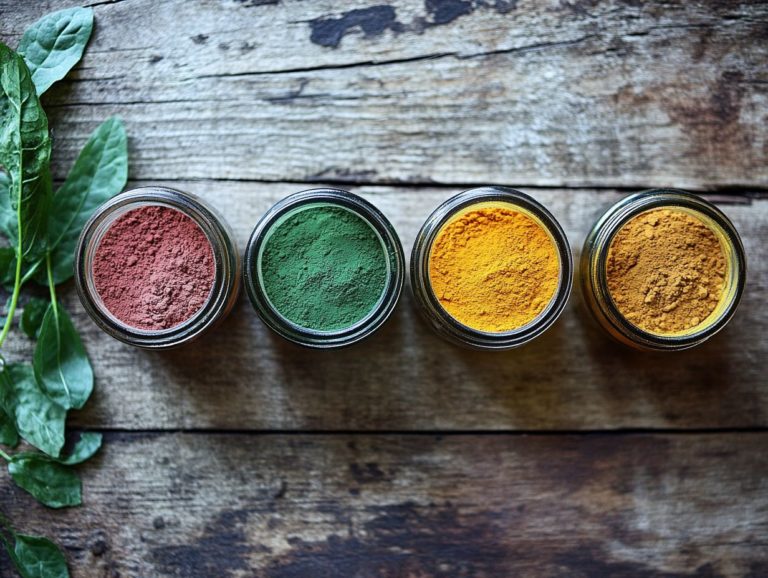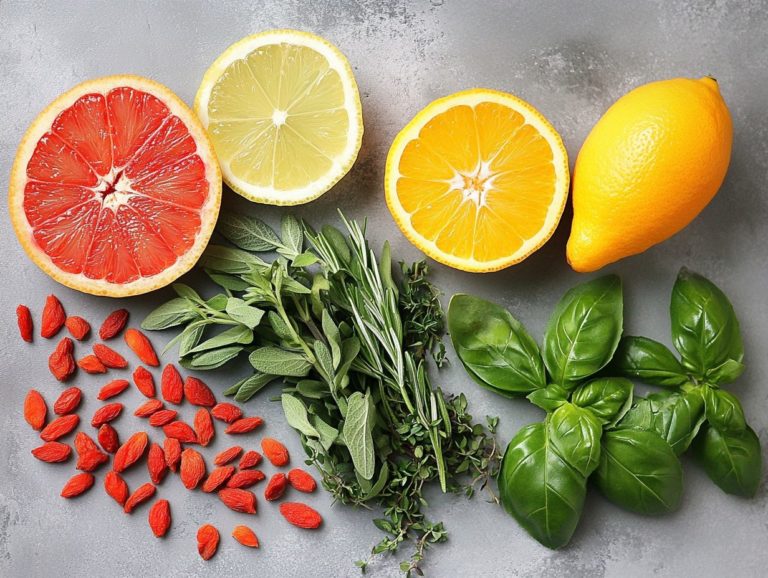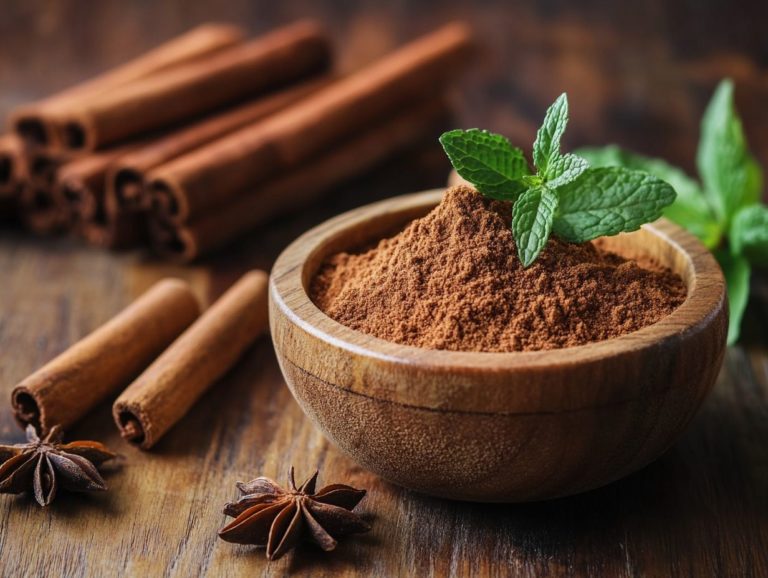The Nutritional Aspect of Spirulina and Its Benefits
Spirulina, the striking blue-green algae, has become quite the superstar in the superfood arena lately. It s loaded with essential vitamins and minerals that support your overall well-being.
This article explores the many health benefits of spirulina, highlighting its antioxidant properties and potential for weight loss. Discover delightful ways to weave it into your diet along with crucial safety tips to keep in mind.
Take your health to the next level today with this nutrient-dense algae!
Contents
- Key Takeaways:
- Nutritional Profile of Spirulina
- Health Benefits of Spirulina
- How to Incorporate Spirulina into Your Diet
- Potential Risks and Precautions
- Frequently Asked Questions
- What is spirulina and why is it considered a superfood?
- What are the main nutritional benefits of consuming spirulina?
- How does spirulina benefit our overall health?
- Is spirulina safe for everyone to consume?
- How can spirulina be incorporated into our diet?
- Are there any potential side effects of consuming spirulina?
Key Takeaways:
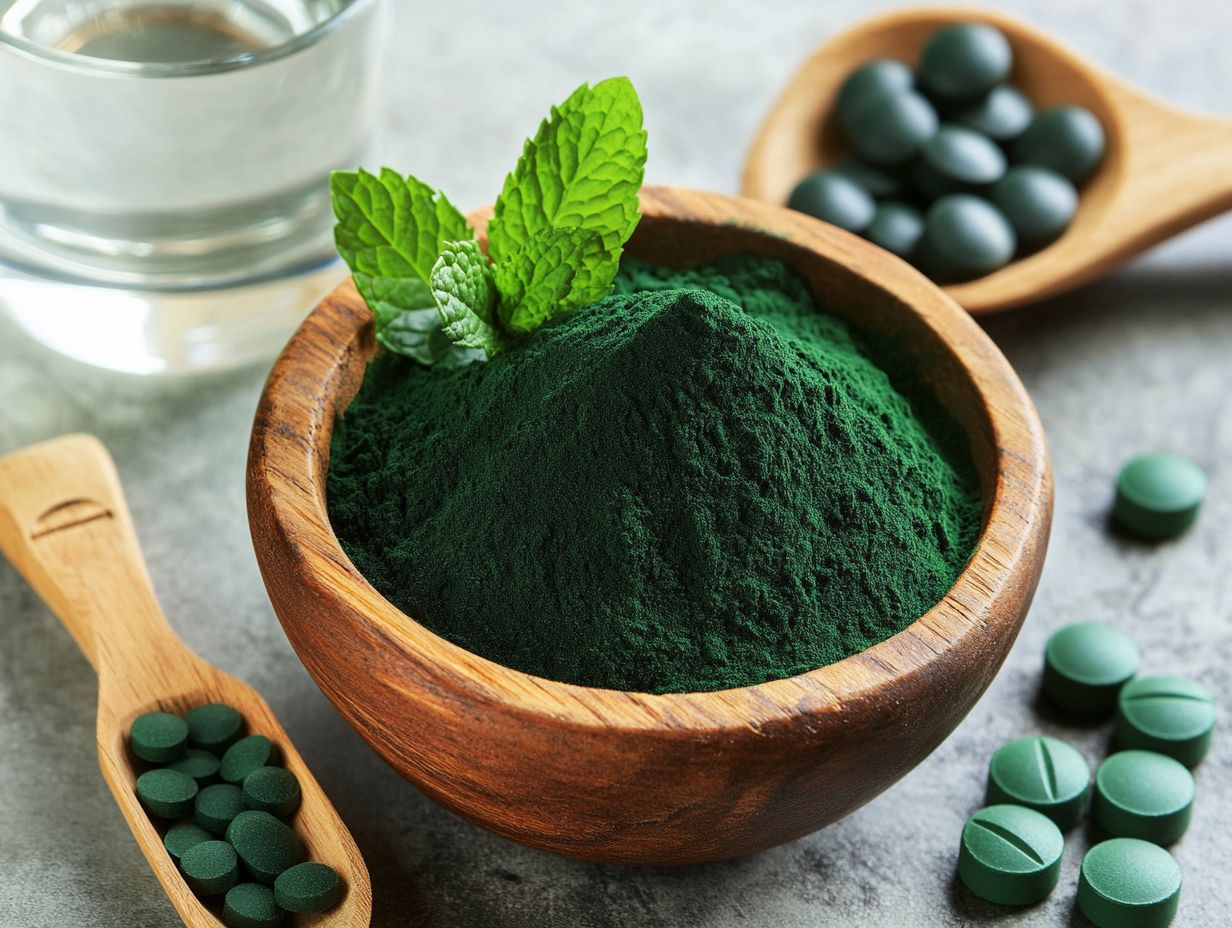
- Boost your immunity with Spirulina’s rich essential vitamins and minerals, making it a highly nutritious superfood.
- Experience its antioxidant and anti-inflammatory benefits that may help reduce inflammation and enhance your overall health.
- Incorporate Spirulina into your meals easily through various recipes while following recommended dosages. Consult a doctor if you have any concerns.
What is Spirulina?
Spirulina is a nutrient-rich dietary supplement derived from blue-green algae. It has a fascinating history that dates back to the Aztecs and places like Lake Chad.
This superfood is celebrated for its impressive protein content and many health benefits, making it a sought-after choice for those exploring natural remedies.
It thrives in both freshwater and saltwater environments, often produced in controlled settings to enhance purity and nutrient levels. The vibrant green color signifies the rich presence of chlorophyll.
Spirulina is recognized for its role in traditional medicine across cultures. Unlike conventional supplements that may focus on isolated vitamins or minerals, spirulina offers a comprehensive nutritional profile that supports overall wellness. It s an excellent option for health-conscious individuals.
Nutritional Profile of Spirulina
The nutritional profile of Spirulina is extraordinary, providing a wealth of essential vitamins and minerals. It serves as an exceptional protein source for both vegetarians and vegans.
This blue-green algae is packed with vital nutrients such as iron, magnesium, zinc, and copper, solidifying its reputation as a potent dietary supplement.
Essential Vitamins and Minerals
Spirulina is a nutrient powerhouse, packed with essential vitamins and minerals like folate and selenium. These are vital for your overall health and wellness.
Its remarkable vitamin profile bolsters your immune system and aids in lowering blood pressure and cholesterol levels. Spirulina also has an impressive array of vitamins, including B12, crucial for energy production and the formation of red blood cells.
This superfood is rich in iron, an essential mineral for oxygen transport in your body, making it an excellent alternative to meat sources like beef and chicken.
The antioxidants in Spirulina include beta-carotene and various natural compounds found in plants. They work to combat oxidative stress, enhancing your skin health and potentially reducing the risk of chronic diseases.
Compared to other green foods, Spirulina shines with its high protein content and nutrient density, making it an invaluable addition to your diet.
Health Benefits of Spirulina
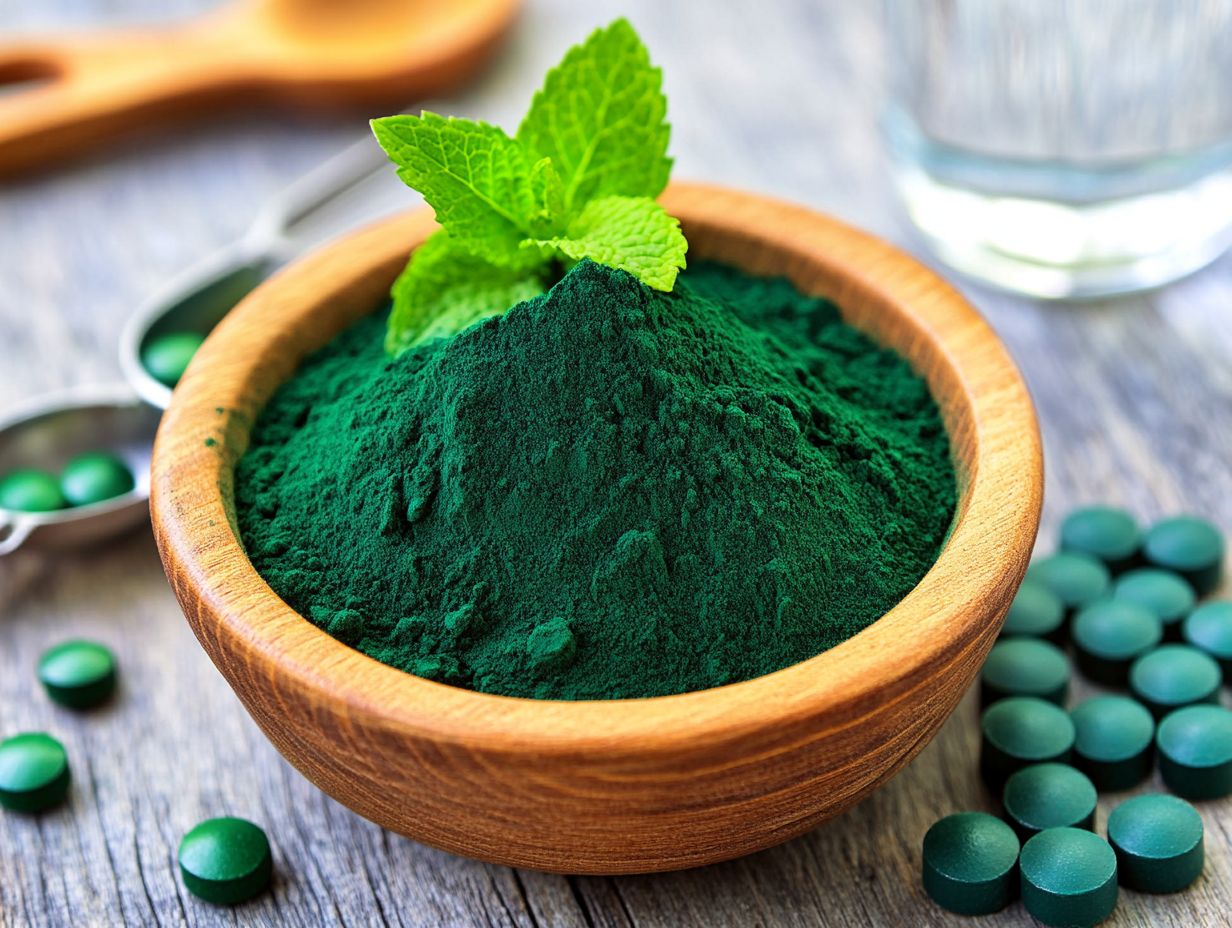
Spirulina offers impressive health benefits, particularly its antioxidant properties that combat oxidative stress and strengthen your immune system. This remarkable blue-green algae has shown potential in treating conditions like allergic rhinitis and fatty liver disease, establishing it as a versatile and valuable dietary supplement for your wellness journey.
Consider trying Spirulina today or consult a professional for personalized advice on incorporating it into your diet.
Antioxidant Properties
The antioxidant properties of Spirulina stand out as one of its most compelling health benefits, helping you neutralize harmful free radicals (unstable molecules that can damage cells) in your body. This remarkable blue-green algae is rich in potent antioxidants, such as phycocyanin, which not only promote your overall health but also bolster your immune system.
Spirulina also contains other important antioxidants, like beta-carotene and vitamin E. These work together to combat oxidative stress, a significant contributor to various chronic diseases. Research shows that these antioxidants can lower your risk of heart disease by improving cholesterol levels and reducing inflammation. Regularly eating Spirulina can enhance your body s natural defenses against infections, as emphasized in a review published in the Journal of Medicinal Food.
Integrating this nutrient-dense algae into your diet could improve skin health by enhancing elasticity and minimizing signs of aging. Its remarkable ability to scavenge free radicals effectively plays a key role in this benefit.
Anti-inflammatory Effects
Spirulina s anti-inflammatory effects are nothing short of remarkable, offering potential relief for individuals dealing with conditions where the body attacks itself and various inflammatory issues. Its unique compounds work diligently to reduce inflammation, contributing significantly to your overall well-being.
The magic lies primarily in its rich antioxidant composition, especially phycocyanin. This compound has demonstrated the ability to inhibit inflammatory pathways. By modulating your immune response, Spirulina reduces markers of inflammation, such as cytokines, and may ease symptoms tied to specific autoimmune disorders like rheumatoid arthritis and lupus.
Clinical studies show a strong link between Spirulina supplementation and decreased disease activity in these conditions. This natural supplement could be an invaluable ally in managing chronic inflammation. Continued research is vital to fully grasp its potential and refine its application in therapeutic settings.
Potential Weight Loss Aid
Spirulina is often celebrated as a potential ally in your weight loss journey, thanks to its impressive protein content and appetite-suppressing qualities. This dietary supplement can elevate your metabolism and support fat burning, especially when paired with a balanced diet.
Packed with numerous nutrients, including essential amino acids and vitamins, Spirulina not only helps quell your cravings but also boosts your overall energy levels. Research suggests that adding Spirulina to your daily routine can lead to notable reductions in body weight and fat mass.
Individuals who embrace Spirulina often feel more satisfied with smaller portions, making it easier to stick to healthier eating habits. Its rich antioxidant profile can also help combat oxidative stress, enhancing your metabolic health and efficiency.
In essence, this remarkable superfood could be a valuable asset in your weight management strategy!
How to Incorporate Spirulina into Your Diet
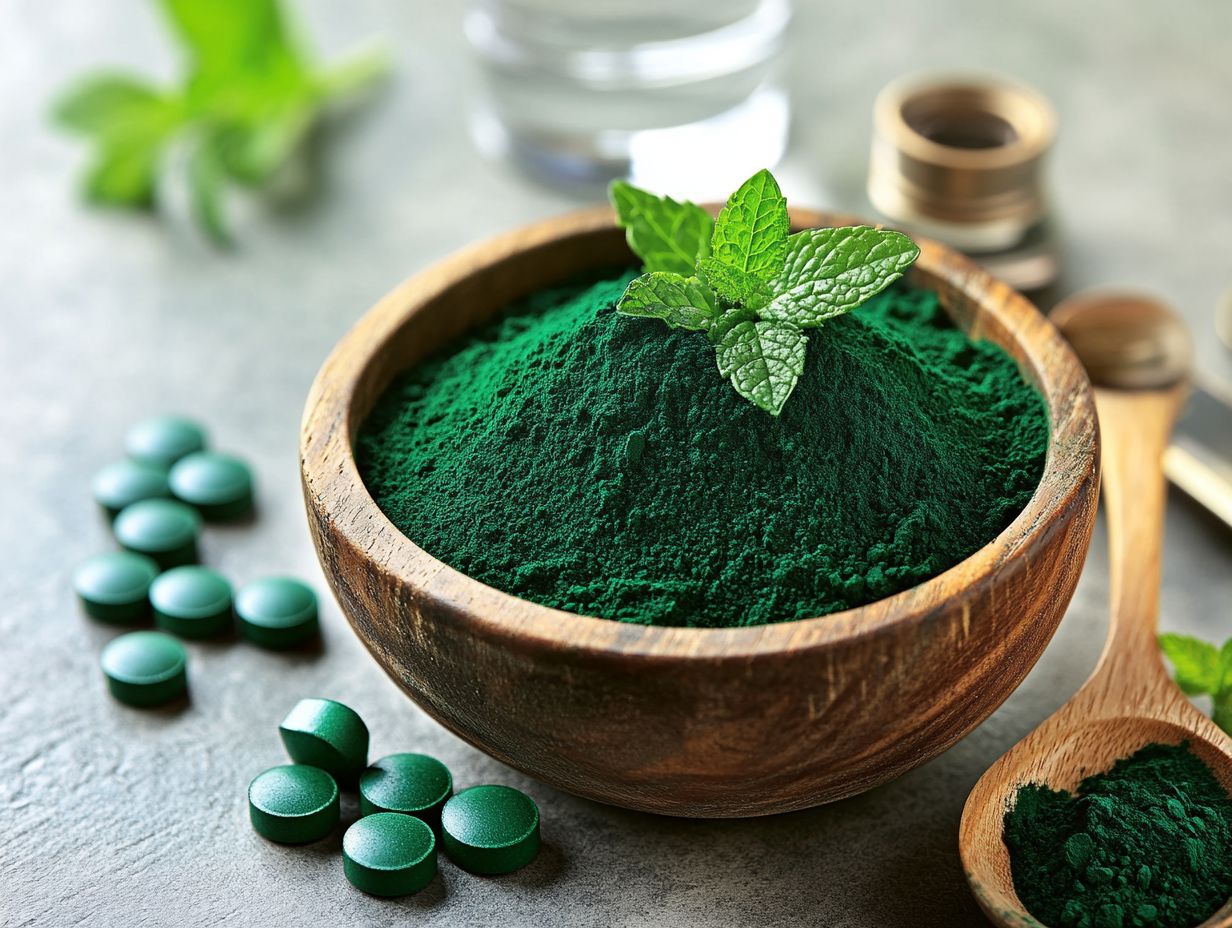
Incorporating Spirulina into your diet can be both simple and enjoyable. This remarkable dietary supplement lends itself beautifully to a variety of recipes, or you can opt for the convenience of powdered, tablet, or capsule forms.
By following the recommended dosages, you can effortlessly unlock the myriad health benefits this superfood has to offer. Don’t miss out on the chance to boost your health with Spirulina!
Recipes and Dosage Recommendations
When you re looking to harness the benefits of Spirulina, you’ll find various recipes that incorporate this dietary supplement seamlessly while keeping within the recommended dosages. From smoothies to energy bars and salad dressings, there are plenty of delightful ways to enjoy the health benefits of this remarkable blue-green algae.
Start your day with a delicious Spirulina smoothie that s as nourishing as it is tasty. Just blend one teaspoon of Spirulina powder with a banana, a cup of spinach, and your preferred almond milk for a nutrient-packed beverage that will set a positive tone for the day.
Energy bars are another excellent option. Combine one cup of oats, half a cup of nut butter, and a tablespoon of Spirulina. Press the mixture into a lined tray and chill it until firm. You’ll have a convenient snack that’s both tasty and energizing.
For a refreshing salad dressing, whisk together two tablespoons of olive oil, one tablespoon of apple cider vinegar, and a teaspoon of Spirulina. This vibrant concoction enhances your salads and adds a health-boosting flair.
Each of these recipes elevates your culinary experience while delivering essential vitamins and antioxidants, contributing to your overall well-being. Try these recipes today or consult a healthcare provider for personalized advice.
Potential Risks and Precautions
While Spirulina is widely regarded as safe for most individuals, it’s crucial to be aware of the potential risks and side effects that shouldn t be disregarded.
Understanding any interactions with medications or existing health conditions is essential for making informed choices about its use.
Side Effects and Interactions
Some individuals may encounter side effects from Spirulina, such as digestive issues or allergic reactions, especially if they have pre-existing conditions. It s essential to be mindful of potential interactions with medications.
You might experience symptoms like nausea or diarrhea. If you have allergies to seafood, pollen, or other substances, you could face intensified reactions due to cross-reactivity. Spirulina may also interact with blood-thinning medications, increasing the risk of bleeding, and with medications that influence blood sugar levels, potentially leading to hypoglycemia.
To ensure your safety, it’s wise to consult with a healthcare provider before starting any Spirulina supplementation, particularly if you’re currently on prescribed medications or have underlying health issues that could elevate the risk of adverse effects.
Frequently Asked Questions
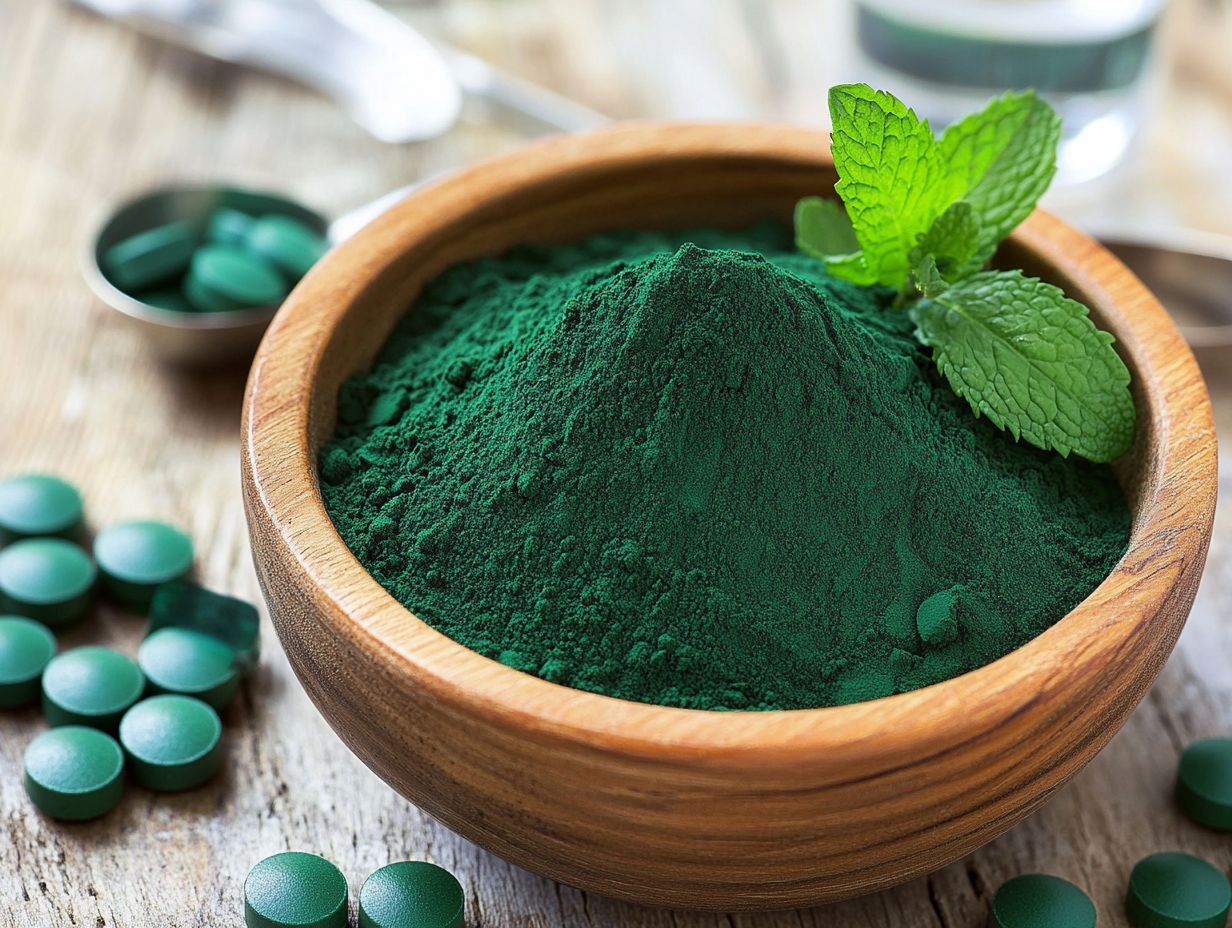
What is spirulina and why is it considered a superfood?
Spirulina is a type of blue-green algae that grows in both fresh and saltwater. It is considered a superfood because it is rich in essential nutrients such as protein, vitamins, and minerals.
What are the main nutritional benefits of consuming spirulina?
Spirulina is a complete protein source, containing all essential amino acids. It is also high in iron, B vitamins, and antioxidants, making it a great addition to any diet.
How does spirulina benefit our overall health?
Due to its high nutrient content, spirulina has been linked to various health benefits, including improved immune function, heart health, and brain health. It may also help with detoxification and reducing inflammation in the body.
Is spirulina safe for everyone to consume?
Spirulina is generally considered safe for most people, including pregnant and breastfeeding women. However, those with autoimmune disorders should consult with their doctor before adding it to their diet.
How can spirulina be incorporated into our diet?
Spirulina can be consumed in various forms, such as capsules, tablets, powders, and flakes. It can be added to smoothies, juices, sauces, or even sprinkled on top of salads or soups.
Are there any potential side effects of consuming spirulina?
In rare cases, some people may experience mild side effects such as upset stomach, nausea, or allergic reactions. It is essential to start with a small dose and gradually increase it to avoid any adverse reactions.



